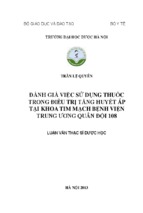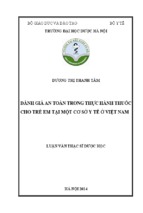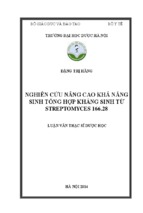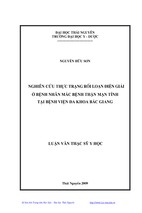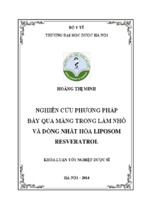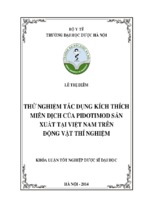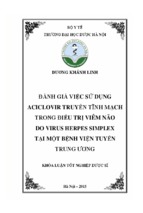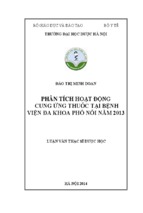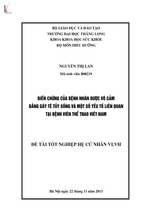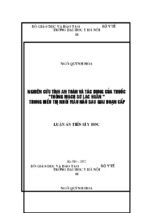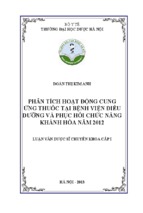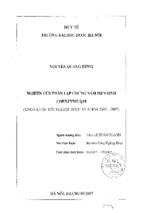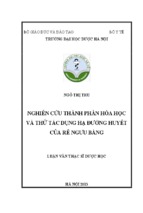THE EFFECT OF CORPORATE SOCIAL RESPONSIBILITY ON
COMPANY’S FINANCIAL PERFORMANCE
“A case study of NamTrieu Company"
BY
NGUYEN HAI MINH
Graduation Project Submitted to the Department of Business Studies, HELP
University College, in Partial Fulfillment of the Requirements for the Degree of
Bachelor of Business (Accounting) Hons
Otc 2010
Declaration of Originality and Word Count
1
DECLARATION
I declare that this graduation project is based on my original work except for
quotations and citation which have been duly acknowledged. I also declare that it has
not been previously or concurrently submitted for any other courses/degrees at HELP
University College or other institutions.
Word Count: 10,845 words.
Nguyen Hai Minh
Date
2
Abstract
THE EFFECT OF CORPORATE SOCIAL RESPONSIBILITY ON
COMPANY’S FINANCIAL PERFORMANCE
“A case study of NamTrieu Company"
BY
NGUYEN HAI MINH
Oct 2010
Supervisor: Dr. Le Van Lien
Globalization and the rapid advancement of technology offer many opportunities for
economic development and social, especially with developing countries such as
Vietnam. Globalization also brings serious challenges such as financial crises,
insecurity, and poverty. Settlement of social problems is the condition for stability
and economic development. In business, too, the development of a business is always
accompanied by Corporate Social Responsibility that business must address
concerns. The successful implementation of social responsibility particularly as
businesses becomes more meaningful in the current period of integration when
Vietnam became an official member of the World Trade Organization.
3
Table of contents
Chapter 1: INTRODUCTION
1.1
Research Background
…………………………………………..…..……….. 1
1.1.2 CSR in the world…………………………………………………………….1
1.1.3
CSR in Vietnam………………………………..……….…………………5
1.2
Reason for Future
Research………………………………………………10
1.2.1
Objectives of Research………………………………………….………..10
1.2.2 Structure of
Research…………………………………………………….10
CHAPTER 2: LITERATURE REVIEW
2.1.
The overview of CSR
…………………………………………………....12
2.2
CSR motivates Financial
Performance……………………………………19
CHAPTER 3: RESEARCH METHODOLOGY
3.1 Overview………………………………………………………………………25
4
3.2 Sphere of Research…………………………………………………….………25
3.3 Data
collection…………………………………………………………………26
3.4. Research method................................................................................................27
3.5 Sampling
………………………………………………………………………28
3.6 Hypothesis……………………………………………………………………..28
CHAPTER 4: RESULT ANALYSIS
4.1. The employees of Nam Trieu Company appreciate the company‟s CSR
implementation……………………………………………………………………..30
4.1.1 Figures and general discussions …………………………………….…...…..30
4.2 There is a significant positive relationship between CSR and financial decision
making…………………………………………………………………..………….37
4.2.1 Figures and general discussions…………………………………….………..37
CHAPTER 5: CONCLUSIONS AND RECOMMEDATIONS
5.1 Conclusion…………………………………………………………………...…43
5.2
Recommendations…………………………………………………….……...…44
5.3 Limitations…………………………………………………………………...…46
REFERENCE……………………………………………………………………....47
APPENDIX…………………………………………………………………………50
5
List of Figures and Tables
Exhibit 1: 10 Principles of UN Global Compact …………………………………….4
Exhibit 2: Carroll‟s pyramid………………………………………………………...17
Table 1: Question 1 – Result analysis……………………………………………….31
Exhibit 3: Question 2 – Result analysis………….………………………...………..32
Table 3: Question 3 – Result analysis…………………………………..…………..33
Table 3: Question 4 – Result analysis………………………………..……………..34
Exhibit 4: Question 2 – Result analysis…………………………..………………...37
Table 4: Question 6 – Result analysis……………………………..………………..38
Table 5: Question 7 – Result analysis………………………………..……………..39
Table 6: Question – Result analysis………………………………………………..32
6
List of Abbreviations
CSR
Corporate Social Responsibility
RI
Responsible Investment
IR
Investor Relations
WTO
World Trade Organization
VCCI
Viet Nam Chamber of Commerce and Industry
SME
Small and medium enterprises
PR
Public Relations
7
CHAPTER 1: INTRODUCTION
1.1 Research Background
1.1.2 CSR in the world
The increasing globalization has made persons, goods and capital move quickly
around the world and facilitating access to information and communication. A
progressively larger amount of trade and investment from the world developed many
countries and one third of world trade internal money is transferred by companies.
This change in the international arena has created many new opportunities and
capabilities as well as new challenges. Recognizing the interest of consumer
worldwide development of production methods, working conditions and
environmental impacts, there is a growing demand of combined CSR strategy with
the company‟s production.
On worldwide, there are many large companies paying a lot of money to become an
ideal business model, and to be accountable to society such as Best Buy with the
application of product recycling program or Starbucks, the coffee companies are
present across the corner of the planet, has embarked on a series of community
activities. Evian, the famous French mineral water, distributes products in the water
bottle-friendly environment. To Search engine Google Company, in Googleplex
headquarters, the employees are treated like a very precious asset. General Electric
use $ 2 billion annually to research new technologies to protect the environment.
8
Deputy Head of Public Relations of Best Buy, Prahl Paul has stated that "We just
feel we will succeed in the marketplace if we take social responsibility." In many
corporate, CSR report often accompany with the annual report. In developed
countries, the cost of social responsibility for the research and development accounts
for more than the cost to a charity, although the cost of philanthropy is not small.
In addition to ensuring the quality of life for employees, environmental protection,
and development of products that create benefits for consumers and the environment.
Many companies also built charity funds and contribute to the development of
society and community. Royall Dutch Shell established charity funds, including the
construction of educational centers Early Learning Centre in South Africa to educate
children and teach skills for adults.
World Bank and Merck pharmaceutical company has launched an initiative to raise
the fund of U.S. $ 50 million including the donation of Mectizan products to help 28
African countries eliminate disease. The billionaire, along with the company's funds
also contributed a lot to do charity work like Bill Gates or Warren Buffet.
Consumers today are not only interested in product quality but also appreciate the
way the company created the products whether the product is environmental friendly
and safety. In many countries, there are many community trends are trying to protect
consumers such as boycott fringe foods aimed at companies producing fast food,
fizzy drinks, Fairtrade trends (ensuring fair material price of product, safety working
conditions in factories from the 3rd countries), avoiding to use of fur products,
products of exploitative child labor by Nike and Gap and shopping with a
Conscience. Currently most companies have a Code of Conduct which emphasizes
9
the issue of CSR thus it helps to improve the company image in the community and
help companies improve sales.
In the survey by McKinsey in 2007, 84% of senior administrators wanted to give
contribution to the community should for improving shareholder value, 16% said that
making profit is the only goal. When asking about the negative impacts that large
companies can effect to the community, 65% replied that environmental pollution,
40% replied that put business interests than to human health, 30% answered
companies are putting pressure on politicians1.
Under pressure from society, most large companies have taken proactive CSR into
their program activities in earnest. Thousands of programs have been implemented,
such as saving energy, reducing carbon emissions, using recycled materials, solar
energy, civil architecture and environmental improvement of living water, literacy,
school construction, relief victims of natural disasters, the establishment of funds and
research center on AIDS Vaccines. Some leading companies can be name at the
forefront of these activities, such as TNT, Google, Intel, Unilever, Coca-Cola, GE,
Nokia, HSBC, Levi Strauss, GlaxoSmithKline, Bayer, DuPont, Toyota, Sony, UTC,
Samsungs. According to Gingving USA Foundation, the amount of business to
contribute to the social activities worldwide is up to 13.77 billion USD (2005) and
nearly 1,000 companies are rated as good corporate citizens. Especially in the case of
Grameen Bank by TS, Muhammad Yunus has provided credit to 6.6 million people,
97% of them are poor women in Bangladesh borrowing money to improve their
lives. He was awarded the Nobel Peace Prize in 2006.
In terms of state management, many countries have institutionalized CSR contents
into the laws and regulations in many different forms. On the wider scope, the efforts
1
Manh Kim (2008), "Corporate citizen" on “Tuoi Tre” 10/12/2008
10
to make CSR become an international practice have become a reality. In 1999, a
global compact was proposed by the UN Secretary Kofi Annan at the World
Economic Forum. On July 2000, United Nations Global Compact (UNGC) was
officially launched. This rule set consists of 10 rules such as to ensure respect for
human rights, child abuse prevention, and environmental protection. Although it is
not a binding document, it is recognized as a formal framework to discuss on the
forums of the United Nations. SCR is also recognized very early on by the European
Commission officially. In addition, CSR has been also put on the agenda official
APEC summit in November 2008 in Lima, Peru.
Table 1: 10 Principles of UN Global Compact
1. Businesses should support and respect of human rights has been published
internationally
2. Make sure not complicit with the abuse of human rights
3. Businesses must support the freedom of association and the recognition and rights
of collective labor agreements
4. Eliminate all forms of forced labor and forced labor
5. Eliminate the use of child labor
6. Eliminate discrimination in employment and occupation
7. Businesses must support the plan for the prevention of environmental challenges
8. Implementation of initiatives to further improve the environmental responsibility
9. Encourage the development and dissemination of technology-friendly environment
10. Enterprises must combat corruption in all its forms, including demanding bribes
and accepting bribes.
11
1.1.3
CSR in Vietnam
In How to report the company is accountable for tracks in 2008, Plesch and
Blankenburg stated that society needs successful businesses, but businesses are now
gradually controlled society. Like a child too that is coddled by their parents and he
gradually have more freedom, until the parents can not control him anymore.
Everyone wants the child to develop well, so no one has put any limits on him. Until
things are broken, the whole house now will suffer the adolescent boy. The
comparison that reminds us to the Vedan case, the Taiwan MSG manufacturer has
caused serious pollution to the ThiVai river in Dong Nai province. This
environmental crisis has destroyed Vedan brand name, a precious intangible asset
that the company has built for many years. In this crisis, the company was lack of
community responsibility and social responsibility is not binding the company's
strict. CSR is becoming one of the most important issues in developed countries but
it has not been considered adequately in attention Vietnam.
In recent years, Vietnam‟s economy has integrated into the world economy.
Economic growth in Vietnam in the past two years has exceeded 8% per year and is
aiming for the national median income in 2010 (ITPC, 2007). Vietnam is suffering
from a shortage of skilled labor and an appropriate system of laws in order to
increase competition and investment in infrastructure. As CSR is getting more
attention around the world, Vietnam has a lot left to learn considering that many
companies in Vietnam do not really see the importance of CSR. To be able to
compete on the world today, companies must be able to ensure human rights, labor
conditions and safety requirements, providing quality products faster and higher.
12
Although the goal is such policies must come to corporate to generate initiatives for
companies in Vietnam.
CSR was introduced into Vietnam through the activities of multinational companies
investing in Vietnam. These companies often have Code of Conduct which can be
applied in many different markets. CSR of almost foreign companies has
implemented efficiency in Vietnam. To name some examples such as “I love
Vietnam” of Honda Vietnam, the educational programs for personal hygiene for
children in central provinces of Unilever, the computer training programs TOPIC64
of Microsoft, Qualcomm and HP, the program of surgery for congenital heart defects
Samsung, the program recovery of eyesight to the poor children of the Western
Union.
For domestic companies, almost exporting companies have access to the CSR.
Orders from US, Japan, EU require businesses of footwear must be applied to
application of good working condition labor (SA8000 standards) or sanitary and food
safety for seafood businesses. Besides, many domestic private companies have
implemented CSR fairly well, for example Mai Linh Corporation, Tan Tao Group,
Duy Loi, ACB, Sacombank, Kinh Do Bakery2.
Aware of the CSR, there were some notable seminars and conference discussing
topics such as the 6th Asian CSR forum discuss about the social responsibility of
enterprises (Diễn Đàn Châu Á trách nhiệm xã hội của doanh nghiệp) on October 13th
2007 at HoChiMinh City, the conference “Improving the competitiveness of Vietnam
through the social responsibility of enterprises “was held on 8th January 2008 by
VCCI. Every year, Chamber of Commerce and Industry of Vietnam (VCCI)
2
McBarnet Doreen, Voiculescu Aurora, Campbell Tom Ed. (2007), The New Corporate Social
Accountability: Corporate Social Responsibility and the Law, Cambridge University Press, the UK.
13
collaborate with the Ministry of Planning and Investment, Ministry of Industry and
Trade, Ministry of Natural Resources and Environment, the General Confederation
of Labour of Vietnam holds a press conference to give "CSR Award". This award
honors and praises the businesses implement Corporate Social responsibility and
raise awareness about the role and benefits of corporate social responsibility for
sustainable enterprises. In 2006, there were 50 textile enterprises and footwear
participated. According to Dr. Doan Duy Khuong - Vice President of Chamber of
Commerce and Industry of Vietnam, "CSR is becoming one of the requirements for
the enterprise if the enterprise does not comply with CSR will not be able to gain
access to global markets World."
But in Vietnam, the implementation of CSR is still relatively difficult. First is the
understanding of the business of CSR is not fully understood. The manager simply
think CRS is doing charity works and they do not understand that CSR comes from
within the company. Second impact due to the implementation of CSR is a
businesses lack financial resources, and techniques to implement CSR standards,
especially small and medium enterprises, where most of Vietnam enterprises are
SMEs.
The evaluation of CSR implementation specified in the rules of the Code of Conduct
(Code of Conduct or Code of Ethics) and standards such as SA8000, WRAP, ISO
14000, GRI but these standards not an agreement between the government and the
provisions of international conventions, therefore, is binding only between the export
or set by the companies themselves. We already have companies producing clean
vegetable production, aquaculture clean, clean coal production. But these actions
14
carry more mandatory or spontaneous than a voluntary employment associated with
business operations and business image.
Our country has made good business people associated with the image of businesses
that Duong Thi Bach Diep, Chairman Diep Bach Duong Co., Ltd., have supported
the fund, "the poor" of the Vietnam Fatherland Front Committee 18 billion VND
Nguyen Thi Dieu Hien, director of aquatic products processing Co. Peace ... in
addition we also support the activities of natural disasters, flooding of businesses and
entrepreneurs.
In addition, Vietnam also had an official forum to discuss about CSR at: http: / /
www.vietnamforumcsr.net/ which is designed by Action Aid International Vietnam.
Growth and ecological environment has always been two opposing problems of
developing economies. After the process of rapid economic growth, the environment
of many countries has been destroyed. Vietnam Government has expressed particular
concern about this issue in the "Orientation for Sustainable Development in
Vietnam" to the country's sustainable development on the basis of economic
development, social development, environmental protection (Article 1, Decision No.
153 / QD / CP-TTg, 17th August, 2004). By commitment to the Millennium goals to
show that Vietnam doesn‟t ignore people's quality of life for the target growth in the
short term. But that requires the system of law rules must be strictly controlled and
highly accurate. In terms of state management, Vietnam has the labor law in 1994,
and amended two times in 2002 (the regulations on labor agreements, overtime,
social security, unemployment benefits) and 2006 (the contents of labor disputes and
labor strikes). In the area of environmental performance, CSR activities in Vietnam
15
has made great strides after the environmental protection laws enacted in 2005
replaced the flip-old has almost no effect in 1994. Subsequently, a series of decrees
were issued in time to guide inclusion of environmental protection into the
investment registration procedures, management of construction materials, industrial
wastes, mining. Apparatus of state management on environmental protection,
Vietnam has particular environmental protection at all local level. Notably, in early
2008, the Police Department has established Environmental Police (C36) and the
Environmental Police Department (PC36) in the provinces and cities. Until now the
agency has investigated, detected and handled hundreds of pollution violates, created
good image in public opinions.
However, even when laws are sufficient, then the effect is still low. Many cases of
environmental pollution occurred more than ten years without being detected and
processed to prove that the state agency had not done their full responsibilities. In
some cases, when facing with violations of environmental business, citizens often do
not receive any support from local governments. Add to that a sense, community
consciousness and self-protection consciousness of the Vietnamese community is
low. That leads to some companies easily spleen, such as M3CPD sauce, milk
contaminated with melamine or environmental violates for long periods without
detection of Hyundai, Vedan, Miwon.
In additional, there are not many representatives or intermediary institutions in
Vietnam, for example non-governmental organizations. Those associations and
organizations play a huge role in developed countries. But, the roles of associations
and NGOs are still low in Vietnam. The head of associations are usually retired
16
officials who want to extend their working time. Actually, there was no association
in the presence of consumers in cases of food contamination, environmental in the
past.
1.2
Reason for Future Research
While there are many studies on CSR in Europe, the Americas, just only a small
number of research articles on CSR in Vietnam. This paper can contribute small
detail to clarify the impact of CSR on the financial operations of the company
through specific examples.
1.2.1
Objectives of Research
To summary of the CSR concept and its definition,
To understand the importance of CSR,
To gain insight into SCR applications in business operations of NamTrieu
Company,
To examine the relationship between CSR and financial performance.
1.2.2
Structure of Research
This study is consist of five chapters:
Chapter 1: Introduction
This chapter will introduce the situation of CSR and giving a reason and purpose
of the study.
Chapter 2: Literature Review
17
This chapter will explain the theory and experimental results related to the
problem that research subjects.
Chapter 3: Research Methodology
This chapter will present the method used to solve the problem posed by the
subject in order to achieve overall objectives.
Chapter 4: Result Analysis
This chapter will test the hypotheses which have been proposed.
Chapter 5: Conclusion and Recommendation
This chapter will summarize the content of the graduation project and draw
conclusions.
18
CHAPTER 2: LITERATURE REVIEW
2.1.
The overview of CSR
The first to implement CSR, we can say he was Norris; the first CEO of the company
Control Data. He had outlined the first idea of CSR in 1955. According Norris,
enterprises should use the talents and their resources to meet the needs of society.
The idea is to show the connections and responsibilities between business and
community. But he did not succeed in implementing his ideas. United Way has
developed the idea of Norris into successful strategies to help businesses increase
competitive advantages and long-term community development.
Attention to the consequences arising from the operation of enterprises in particular,
the economic activity in general has a long life, but the concept CSR only appeared
in the years 50s of the 20th century in the USA with H. R. Bowen. The spread of
model Ford - Taylor in corporate governance and the development model of the
welfare state (instead of the employer‟s charity) has obscured the issue of social
responsibility of business industry. Until the early 90s of the 20th century, before the
threats that people think the culprit is the operation of large enterprises and economic
activity in general such as destruction birth rights, family crystal, increases inequality
threatens the social structure, but the damage to public health have done away up the
concept of social responsibility of the business. On the other hand, the response of
the main associations, non-governmental organizations, the civil society in general,
have created a movement of social pressures caused by businesses, especially
corporations, the multinational companies to take action reflected business social
19
responsibility. Theoretical, starting from identifying the business relationship
between the environment around us, the notion of responsibility was extended from
responsibility of improving profitability for shareholders, who ownership, to a place
with responsibility for the ingredients involved (stakeholders).
R. E. Freeman (1984) said: “that the components that are related to individuals may
affect or be affected by the realization of the goals of the organizations (enterprises).
According to A. B. Carroll (1989), CSR can be divided into relevant sections into
two categories: components that are mainly related such as shareholders, employees,
suppliers, customers and indirect related components, including the relationship of
the ingredients voluntarily or involuntarily to business with an escrow or implied
ethical, such as associations, communities, local territorial, non-government
organizations.
Today, there are many different definitions on CSR. Every organization, company,
government recognition has different CSR perspective and personal views,
depending on conditions, characteristics and development levels of their operations.
Keith Davis (1973) gave broad concept: “CSR is the interest of the business and
reaction to beyond problems satisfying the needs of legal, economic and technology.”
Meanwhile, Caroll (1999) said that CSR has a larger scope, “CSR is all about legal
issues, economics, ethics and other areas where society expected of businesses in
each certain time.” According to Matten and Moon (2004):” CSR is a concept that
including of many different concepts such as business ethics, business philanthropy,
sustainable development and environmental responsibility”. The European
Commission defines CSR as “a concept whereby companies decide voluntarily to
contribute to a better society and a cleaner environment.” (Simms 2002). It is a
20
- Xem thêm -

